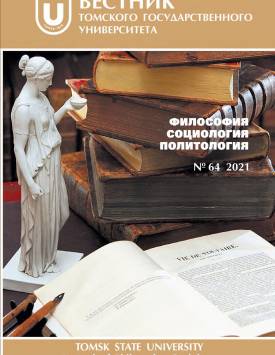The Problem of Justification for Political Violence in the Christian Tradition
The article examines the complex and ambiguous attitude of Christianity to political violence. The author shares the point of view of those researchers who believe that the concept of Christianity’s denial of all violence is too simplistic. After all, otherwise it would be necessary to admit that Christianity denies all power and politics since, although they are not reduced to violence, they cannot be realized without it. However, this is not true. There are two traditions developed in Christianity, which are characterized by their specific attitude to the issue of legitimizing political violence: those who take the positions of Christian pacifism (from radical - non-resistance to evil by violence - to moderate) and those who consider it heresy. Radical Christian pacifism denies the possibility of a moral justification for violence, and its adherents believe that there is no ethically justified reason for it, including even the defense of faith. Another tradition, paying tribute to Christian ideals, is built on the idea of undesirability, but admissibility of the use of violence in public life, and justice becomes the main measure of this admissibility. This topic acquires particular relevance in the conditions of war, where one of the commandments of Christianity, “do not kill”, is inevitably violated. Justice requires the protection of loved ones, and given the realities of the world, which “lies in evil”, Christians conclude that violence is inevitable and it can be ethically justified, however, under certain conditions. These conditions are harsh and they are integral parts of the theory of just war, which was developed in the named Christian tradition. The theme of justice and violence, actualized by early and medieval Christianity, largely provoked modern discussions on the issues of morality and violence, war and virtue, and in general on the “culture of violence”, justifying the importance of not neglecting certain ethical norms in a war. The topic of these discussions is extremely important for the modern world, which is characterized by the increasing complexity and the emergence of new forms of violence that gives rise to the need to combat it and form a humanistic policy that contributes to its moral and normative limitation. It seems that the “developments” of such a policy have been carried out for centuries and are formulated in many cultural traditions, including the Christian one, and can be in demand when forming the foundations of modern humanistic politics.
Keywords
political violence,
Christianity,
moral justification of violence,
problem of legitimizing violence,
pacifism,
just warAuthors
| Avanesova Elena G. | Tomsk State University | avanesovafsf@yandex.ru |
Всего: 1
References
Капустин Б.Г. Моральный выбор в политике. М. : КДУ : Изд-во МГУ, 2004. 496 с.
Свенцицкий В., прот. Христианское отношение к власти и насилию // Азбука веры: сайт. Электрон. дан. [Б.м.], 2005-2021. URL: https://azbyka.ru/otechnik/Valentin_Sventsitskij/hristianskoe-otnoshenie-k-vlasti-i-nasiliyu/(дата обращения: 06.07.2021).
Капустин Б.Г. Критика политической философии: Избранные эссе. М. : Изд. дом «Территория будущего», 2010. 424 с. (Серия: Университетская библиотека Александра Погорельского).
Майка Ю. Социальное учение Католической церкви: Опыт исторического анализа. Рим ; Люблин : Изд-во Св. Креста, 1994. 480 с.
Мусин А., диакон. Церковь. Общество. Власть: Опыт патрологического исследования (Взаимные отношения Церкви, общества и государства по учению ранних отцов Церкви и церковных писателей I-III веков). СПб. ; Петрозаводск : Кругозор, 1997. 192 с.
Основы социальной Концепции Русской Православной Церкви // Азбука веры: сайт. Электрон. дан. [Б.м.], 2005-2021. URL: https://azbyka.ru/otechnik/dokumenty/osnovy-sotsialnoj-kontseptsii-russkoj-pravoslavnoj-tserkvi/#0_16_1 (дата обращения: 12.07.2021).
Лактанций. Божественные установления. Книга V // Азбука веры: сайт. Электрон. дан. [Б.м.], 2005-2021. URL: https://azbyka.ru/otechnik/Laktantsij/bozhestvennye-ustanovlenija/5 (дата обращения: 29.07.2021).
Лактанций. Божественные установления. Книга VI // Азбука веры: сайт. Электрон. дан. [Б.м.], 2005-2021. URL: https://azbyka.ru/otechnik/Laktantsij/bozhestvennye-ustanovlenija/6 (дата обращения: 29.07.2021).
Нравственные ограничения войны: Проблемы и примеры / под ред. М. Коппитерса, Н. Фоушина, Р. Апресяна. М. : Гардарики, 2002. 407 с.
Толстой Л.Н. Письмо Эугену Генриху Шмитту от 12 октября 1896 г. // Лев Толстой: сайт. Электрон. дан. [Б.м.], 2000-2021. URL: http://tolstoy-lit.ru/tolstoy/pisma/1896/letter-109.htm (дата обращения: 03.08.2021).
Толстой Л.Н. По поводу конгресса о мире (письмо к шведам) // Лев Толстой: сайт. Электрон. дан. [Б.м.], 2000-2021. URL: http://tolstoy-lit.ru/tolstoy/publicistika/publicistika-12.htm (дата обращения: 03.08.2021).
Нибур Р. Почему церковь не стоит на позициях пацифизма? // Социально-политическое измерение христианства. М. : Наука, 1994. С. 142-159.
Прокофьев А.В. Идея справедливой войны в западной этической традиции (от античности до середины XVIII в.) // Этическая мысль. 2019. Т. 19, № 2. С. 112-127.
Блаженный Аврелий Августин. О граде Божьем. Кн. 19 // Азбука веры: сайт. Электрон. дан. [Б.м.], 2005-2021. URL: https://azbyka.ru/otechnik/Avrelij_Avgustin/o-grade-bozhem/19 (дата обращения: 12.07.2021).
Фома Аквинский. Сумма теологии. Т. VII // Азбука веры: сайт. Электрон. дан. [Б.м.], 2005-2021. URL: https://azbyka.ru/otechnik/konfessii/summa-teologii-tom-7/(дата обращения: 15.07.2021).
Сисе Х. Справедливая война? О военной мощи, этике и идеалах. М. : Весь мир, 2007. 176 с.
Бугров К.Д., Логинов А.В. Назад к субъекту: теории справедливой войны в современной политической мысли // Полис. Политические исследования. 2020. Т. 29, № 5. С. 114-129.
Куманьков А. Современные классики теории справедливой войны: М. Уолцер, Н. Фоушин, Б. Оренд, Дж. Макмахан. СПб. : Алетейя, 2021. 268 с.
Меланхтон Ф. Аугсбургское вероисповедание // М. Лютер. 95 тезисов. СПб. : Роза мира, 2002. 720 с.
Второй Ватиканский собор. Конституции, Декреты, Декларации. Брюссель, 1992. 573 с.
Кравченко С.А. Спираль усложнения насилия: востребованность гуманистической политики // Полис. Политические исследования. 2019. Т. 28, № 5. С. 43-55.
Апресян Р.Г. Метанормативное содержание принципов справедливой войны // Полис. Политические исследования. 2002. № 3. С. 57-71.

